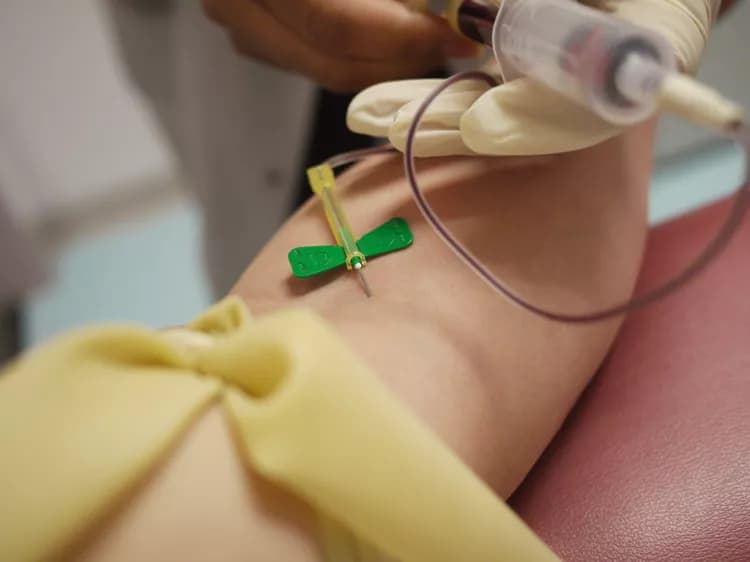
Erythrocyte Sedimentation Rate (ESR) Blood Test
What are the other Names for this Test? (Equivalent Terms)
- ESR Blood Test
- Sed Rate Blood Test
- Westergren Sedimentation Rate Blood Test
What is Erythrocyte Sedimentation Rate (ESR) Blood Test? (Background Information)
- Erythrocyte sedimentation rate (ESR) is the speed at which red blood cells, or erythrocytes, settle to the bottom of a blood sample. The faster the rate, the higher the chance of inflammation or other conditions
- Blood is composed of one-third to one-half cells by volume; the rest is a clear fluid, called plasma. Of these cells, more than 99% are red blood cells (RBCs)
- Red blood cells are flexible, which enables them to squeeze through narrow blood vessels. They sometimes form stacks called rouleaux that resemble dinner plates stacked on top of one another
- During inflammation, proteins (such as C-reactive protein and fibrinogen) and other factors increase the rate at which RBCs stack and clump together. The inflammation can either be acute or chronic. Acute inflammation occurs due to trauma or other sudden event. Chronic inflammation may be due to diseases such as rheumatoid arthritis
- When blood cells stack together in a blood sample, their size and mass increase. This causes them to quickly sink to the bottom of the sample. This is indicative of inflammation factors in the blood, which further indicates disease
- The Erythrocyte Sedimentation Rate (ESR) Blood Test is a test to measure the speed at which red blood cells settle to the bottom of a blood sample. It is used to detect general inflammation and other conditions
What are the Clinical Indications for performing the Erythrocyte Sedimentation Rate (ESR) Blood Test?
Following are the clinical indications for performing the Erythrocyte Sedimentation Rate Blood Test:
- Monitoring therapy for inflammatory and malignant disease
- Headaches
- Neck and/or shoulder pain
- Pelvic pain
- Anemia
- Loss of appetite
- Rapid, unexplained weight loss
- Joint stiffness
How is the Specimen Collected for Erythrocyte Sedimentation Rate (ESR) Blood Test?
Following is the specimen collection process for Erythrocyte Sedimentation Rate (ESR) Blood Test:
Sample required: Blood
Process of obtaining blood sample in adults:
- A band is wrapped around the arm, 3-4 inches above the collection site (superficial vein that lies within the elbow pit)
- The site is cleaned with 70% alcohol in an outward spiral, away from the zone of needle insertion
- The needle cap is removed and is held in line with the vein, pulling the skin tight
- With a small and quick thrust, the vein is penetrated using the needle
- The required amount of blood sample is collected by pulling the plunger of the syringe out slowly
- The wrap band is removed, gauze is placed on the collection site, and the needle is removed
- The blood is immediately transferred into the blood container, which has the appropriate preservative/clot activator/anti-coagulant
- The syringe and the needle are disposed into the appropriate “sharp container” for safe and hygienic disposal
Preparation required: No special preparation is needed prior to the test.
What is the Significance of the Erythrocyte Sedimentation Rate (ESR) Blood Test Result?
The significance of the Erythrocyte Sedimentation Rate (ESR) Blood Test result is explained:
Increased ESR may indicate:
- Heart attack
- Anemia
- Cat scratch fever
- Carcinoma
- Systemic lupus erythematosus (SLE)
- Crohn’s disease
- Endocarditis
- Heavy metal poisoning
- Infection, such as pneumonia or syphilis
- Inflammatory diseases
- Lymphoma, lymphosarcoma
- Multiple myeloma
- Nephritis
- Pulmonary embolism
- Rheumatic fever
- Rheumatoid arthritis
- Subacute bacterial endocarditis
- Temporal arteritis
- Toxemia
- Tuberculosis
- Walderstrom’s macroglobulinemia
Decreased ESR may indicate:
- Elevated blood sugar
- Conditions resulting in high hemoglobin and RBC count
The laboratory test results are NOT to be interpreted as results of a "stand-alone" test. The test results have to be interpreted after correlating with suitable clinical findings and additional supplemental tests/information. Your healthcare providers will explain the meaning of your tests results, based on the overall clinical scenario.
Additional and Relevant Useful Information:
- The result of an Erythrocyte Sedimentation Rate Blood Test is reported in millimeters of plasma that are present in the top of the tube after 1 hour
- Certain factors influence the results of this test and these include pregnancy, aging, and diet
Certain medications that you may be currently taking may influence the outcome of the test. Hence, it is important to inform your healthcare provider of the complete list of medications (including any herbal supplements) you are currently taking. This will help the healthcare provider interpret your test results more accurately and avoid unnecessary chances of a misdiagnosis.
Please visit our Laboratory Procedures Center for more physician-approved health information:
http://www.dovemed.com/common-procedures/procedures-laboratory/
Related Articles
Test Your Knowledge
Asked by users
Related Centers
Related Specialties
Related Physicians
Related Procedures
Related Resources
Join DoveHubs
and connect with fellow professionals

0 Comments
Please log in to post a comment.